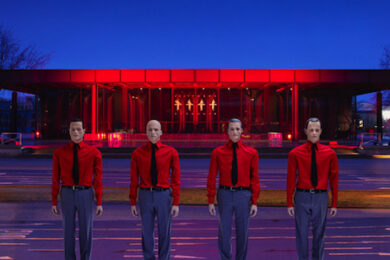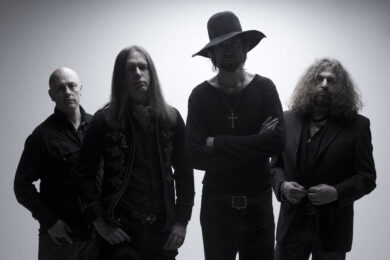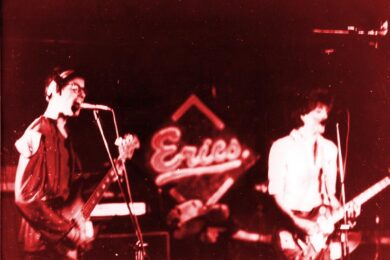In the same week that London’s looters came out to play, songwriter Iain Woods, aka Psychologist, released the second half of his Epidural Collection, the Propeller EP. Although only the most dedicated fans considered braving the streets for its launch at Islington’s Electrowerkz, Propeller itself set a fitting audible tone. Unlike its softly-softly predecessor, Waves of OK, Propeller is a nasty, pounding release, full of the sort of relentless energy and unease that might fire it out of a bedroom studio in an attempt to nick the last pair of Nike Airs from Footlocker. Closing duo ‘Disco At Twin Peaks’ and ‘Séance’ in particular recall the darker side of UK garage, all nervy percussion and heavy pulses of bass.
Its creator, however, is an elegant and ethereal performer, who giggles down the other end of the phone as he nearly falls down the stairs of a bus in answering my call. I interrupt his sunny Sunday afternoon chill out in Shoreditch’s ever-pleasant Arnold Circus, where a tramp is asleep in the ‘craziest position you’ve ever seen’ (it really is, he sends me a photo.) His live performance a few days ago was an infectious mix of grimy underground party and performance art, violin bows aquiver as Woods bellowed out soaring gospel highs over scuzzy, synthy bass lows.
As he explains, Woods has few issues with the lazy media comparisons between his first release and that of James Blake’s recent self-titled debut. Still, if he wanted to show he could do more than blubstep, this EP will certainly achieve that. It deserves to be played with the same mania with which Lady Macbeth uttered the words that name its first track: ‘Out, Damned Spot!’
How was your EP launch?
Iain Woods: It was… ok. It was kind of a weird one. Usually I get really, really nervous or panicky or stressed out, but I didn’t really have that many feelings beforehand. Because of the riots on Monday we very nearly cancelled it a few times, so in a way, right up to the minute we went on, it felt almost like a cancelled gig. I think a lot of people were still quite wary about coming out, so I wasn’t expecting that much from it, but then we came on and there were quite a lot of people there, which was a nice surprise. I think because of that I was in quite a chilled out mood.
How do you engineer your live performances?
IW: It changes from record to record really. Lewis Bellwood, basically the other half of Psychologist, is a very old collaborator of mine and does all of the sound engineering on the record, but he’s usually instrumental in translating it into a live thing. I wanted Propeller to be a bit of a rave, as opposed to Waves of OK which I wanted to be very organic, a more traditional acoustic gig. This time around, I knew which gadgets I wanted to use but I hadn’t actually played them before – things like MPCs and APCs. Lewis bought himself some gadgets and we did that. Kwesi Darko [aka Blue Daisy] has also been working with us. He got in contact with me after the first EP and said he’d like to work together. He’s a really good producer and I knew that his live set was similar to what I wanted to do, so he came along when I was recruiting for my band. He’s got an album out in October.
There’s a noticeable difference between part one and part two. Why did you choose to release them as two halves of the Epidural Collection, and how did your creative process differ?
IW: The Epidural Collection came about as a result of working on my debut album about a year and a half ago. I was just slogging away at it with no money and no resources. I was trying to get a really particular sound, and I couldn’t work out why I couldn’t – it transpired that what I was trying to achieve was really expensive and that’s why. I was referencing all these super glossy big cinematic kind of soundtrack-style recordings, which are obviously recorded in Hollywood with 100-strong orchestras. I didn’t have the money for it. My manager suggested if I couldn’t get the studio sound I wanted right now, I should just put out the other things I was working on. The two different things I was making turned out to be Waves of OK and Propeller. I just wanted to make an EP which sounded like a big cuddle, and that turned out to be Waves of OK, and then I wanted to make a quite nasty, jarring electronic piece of music which turned out to be Propeller. I actually wanted them to be released a lot closer together, the first one week and another the next, but that was before I really understood how the music industry worked and how much time everything takes. What was meant to be something quick turned into being a year and a half’s worth of work, and a massive learning curve in the music industry as someone who didn’t know anything.
When did you start Psychologist, and how did it happen?
IW: I started recording songs when I was 15, and when I went to art school I carried on making music while I was studying. I met Lewis and he was really into production and taught me how to use programmes that I hadn’t really touched up until then. I didn’t sing in front of anyone until I was 19 or 20, though, and I released my first EP as my Degree Show in Sculpture at Brighton. It’s a bit of a long, convoluted story!
What’s it like being released through Not Even, as an offshoot of Moshi Moshi?
IW: It’s good! What I like about them is that it really feels like I’m releasing something. They have a very punky DIY way of doing things. They’re very hands off and I’ve just done exactly what I want and given it to them. I imagine that on a bigger label there would be a lot more pressure and you might feel like you’re fulfilling a role or image that they might have of you, which you might have to compromise to meet. But Not Even are much smaller and it’s more a case of them putting a stamp on what I’ve done and putting it out there.
Let’s talk about Propeller. What have you tried to do with it?
IW: I wanted it to be cold sounding, as opposed to the warmth of the first EP, and I wanted it to sound unfinished, so that was sort of the starting point. In a way, a lot of it is me getting bored with the limitations of my computer in my bedroom and trying to say goodbye to bedroom music a little bit and working from those limitations, rather than trying to expand them. I wanted to make it sonically very computery and a bit staid and stiff.
Emotionally, I [always] write the songs in my head first, rarely with a computer. All the songs are based on different characters. That’s very different because the first one was very personal and me speaking in the first person about my feelings, it was quite honest and loving. This one the characters are all based on fictional characters or people I’ve come across, so I’ve been getting into the role of somebody else.
There are heavy garage references in there.
IW: The last track, ‘Séance’, is the result of something my brother produced on Logic on my computer. I discovered it a couple of years later and found it, with the sample from Waking Life on it. I couldn’t work out where it had come from, but once I remembered I wrote ‘Séance’ over the top of it and finished the production. I just really like hardcore garage basically, and so does my brother.
There were a lot of comparisons between you and the likes of James Blake and Jamie XX with the first release. How was that?
IW: I just thought it was a shame for James Blake really, because he’s an actual producer, and an amazing one. I’d be a bit offended if I was him and being compared to me. I don’t think of myself as a producer at all, I’m just a songwriter. It’s very flattering, that’s for sure. But I also think that Waves of OK came out a month after James Blake’s album was released, so it was an easy comparison for journalists. He worked towards that sound of piano and voice, which happened to come at the same time for me, but it’ll probably work in the opposite way – I’m definitely moving away from that sound whereas he put out dubstep things first and moved towards it. My album will not sound like that at all, really.
Are you still trying to achieve that big sound with the album?
IW: Yes, but I’ve learned more about production now and that there are ways of achieving that. The album’s interesting because the songs are much older. Waves of OK and Propeller are all about the last year or so of my life, even if they’re not autobiographical. Whereas the album’s from things I wrote when I was a lot younger, so it’s got a more naïve, poppy quality, which I’m really excited about.





